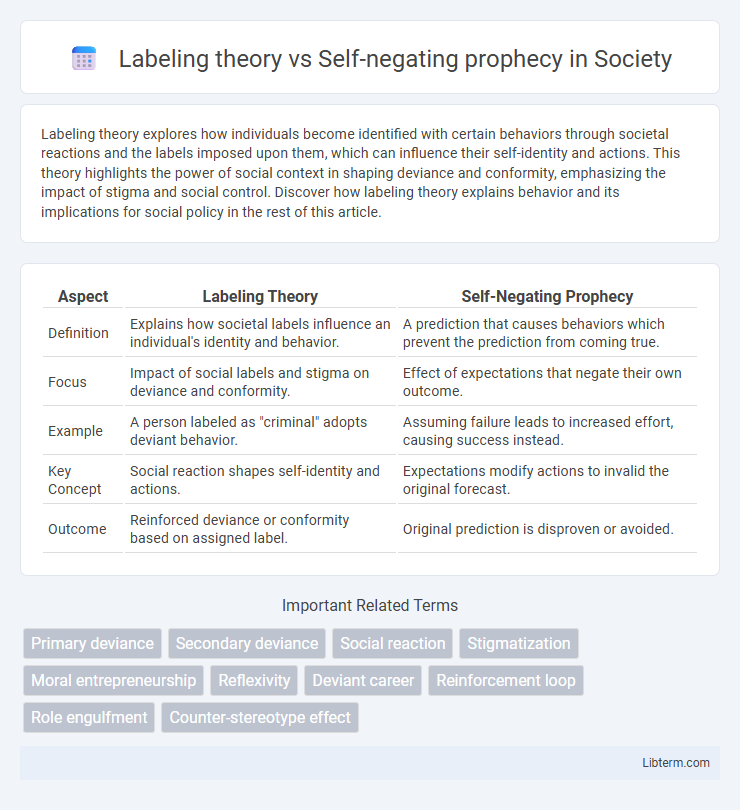Labeling theory explores how individuals become identified with certain behaviors through societal reactions and the labels imposed upon them, which can influence their self-identity and actions. This theory highlights the power of social context in shaping deviance and conformity, emphasizing the impact of stigma and social control. Discover how labeling theory explains behavior and its implications for social policy in the rest of this article.
Table of Comparison
| Aspect | Labeling Theory | Self-Negating Prophecy |
|---|---|---|
| Definition | Explains how societal labels influence an individual's identity and behavior. | A prediction that causes behaviors which prevent the prediction from coming true. |
| Focus | Impact of social labels and stigma on deviance and conformity. | Effect of expectations that negate their own outcome. |
| Example | A person labeled as "criminal" adopts deviant behavior. | Assuming failure leads to increased effort, causing success instead. |
| Key Concept | Social reaction shapes self-identity and actions. | Expectations modify actions to invalid the original forecast. |
| Outcome | Reinforced deviance or conformity based on assigned label. | Original prediction is disproven or avoided. |
Understanding Labeling Theory: An Overview
Labeling theory explains how society's reaction to deviant behavior shapes an individual's self-identity and can lead to further deviance through stigmatization. It emphasizes the power of labels in influencing behavior by reinforcing negative stereotypes and social exclusion. Understanding labeling theory reveals the societal mechanisms that marginalize individuals, contrasting with the self-negating prophecy where expected outcomes fail to manifest due to resistance or rejection of imposed labels.
The Concept of Self-Negating Prophecy Explained
Labeling theory examines how societal labels influence individual identity and behavior, while the concept of self-negating prophecy highlights situations where a predicted outcome prevents itself from occurring due to the individual's actions. Self-negating prophecy involves anticipations that alter behaviors in ways that invalidate the original prediction, effectively negating the prophecy. This concept is crucial in understanding paradoxical social phenomena, where expectations produce reactions contrary to the forecasted results.
Historical Origins: Labeling Theory vs Self-Negating Prophecy
Labeling theory originated in the 1960s within the field of sociology, emphasizing how societal reaction and stigmatization influence deviant behavior by assigning labels that individuals internalize. In contrast, the concept of self-negating prophecy, less formally theorized, derives from critiques of self-fulfilling prophecies, highlighting situations where expectations prevent outcomes instead of causing them. The historical origins of labeling theory are deeply rooted in symbolic interactionism and deviance studies, whereas self-negating prophecy emerged from psychological and sociological analyses of expectation dynamics and behavior modification.
Core Principles of Labeling Theory
Labeling theory centers on how societal labels influence individual identity and behavior by emphasizing the power of social reaction in defining deviance. Core principles include the idea that deviance is not inherent in an act but is defined through social labeling, and labeled individuals often internalize and act according to these imposed identities, leading to behavioral confirmation. This contrasts with the self-negating prophecy, where expectations resist fulfillment, highlighting that labeled behaviors might not always conform to societal anticipations.
Mechanisms Behind Self-Negating Prophecy
Labeling theory examines how societal labels influence individual identity and behavior, often reinforcing deviant actions through social stigma. Self-negating prophecy involves an initial prediction that causes behaviors preventing the prophecy's fulfillment, highlighting mechanisms such as feedback loops and behavior modification based on expectations. These mechanisms include cognitive dissonance reduction and situational adjustments that lead individuals to act contrary to anticipated outcomes, effectively negating the original prediction.
Psychological Effects of Social Labels
Labeling theory explores how individuals internalize and react to social labels, often leading to a reinforced negative identity that affects behavior and self-concept. The self-negating prophecy describes a psychological effect where individuals reject or disprove a label, resulting in actions contrary to societal expectations. Both concepts highlight the powerful influence of social labels on mental health, identity formation, and behavioral outcomes in social contexts.
Real-World Examples: Labeling Theory in Action
Labeling theory explains how being labeled as "deviant" can reinforce criminal behavior, exemplified by juvenile offenders who, once stigmatized by the justice system, often face social exclusion and increased recidivism. In contrast, the self-negating prophecy occurs when an expectation causes behavior that invalidates the original prediction, such as a teacher's low expectations leading to unexpected student improvement. Real-world cases like the "school-to-prison pipeline" illustrate labeling theory's impact, where early labels contribute to escalating deviance and limited rehabilitation opportunities.
Case Studies: Self-Negating Prophecy Outcomes
Case studies examining self-negating prophecy outcomes reveal how anticipated negative behaviors or identities fail to manifest as individuals resist or reject imposed labels. For example, some adolescents labeled as delinquent refuse to engage in criminal activities, contradicting the expectations of labeling theory. These findings highlight the complex interplay between social labels and individual agency, demonstrating that labels do not inevitably produce predicted behaviors.
Key Differences: Labeling Theory and Self-Negating Prophecy
Labeling theory emphasizes how societal labels influence individuals to adopt deviant identities, reinforcing certain behaviors through external social stigma. Self-negating prophecy, in contrast, involves expectations that result in behavior that contradicts or negates the original prediction, thereby invalidating the initial expectation. Key differences lie in their outcomes: labeling theory often perpetuates the labeled behavior, while self-negating prophecy leads to the opposite effect by undermining the anticipated behavior.
Implications for Social Policy and Future Research
Labeling theory highlights how societal reactions to deviance reinforce criminal identities, suggesting social policies should emphasize restorative justice and reduce stigmatization to prevent secondary deviance. Self-negating prophecy studies reveal how negative labels can lead to behavior contradicting initial expectations, implying future research should explore interventions that disrupt these paradoxical outcomes. Both frameworks call for nuanced social policies addressing identity formation and behavioral feedback loops to improve rehabilitation and social integration.
Labeling theory Infographic

 libterm.com
libterm.com